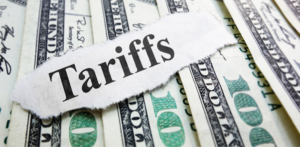Although many American citizens may be questioning “ Liberation Day” there is no doubt that The US administration’s announcement of global tariffs have sent markets and world trade into uncertain times.
How will tariffs impact UK businesses? Are they an opportunity or a risk?
What are the tariffs and how do they apply to UK businesses
At the time of writing this article the tariffs are outlined below. However, as President Trump has made a number of changes on a regular basis since the initial announcements you should check up to date information when you read it!
The good news is that the UK is “trade neutral” with the US, ie that exports and imports are similar in value. Therefore, the imposition of large tariffs on UK goods is unlikely to benefit the US economy significantly.
The UK is subject to the baseline 10% tariff, other countries including the EU are subject to higher rates, although a 90-day pause is currently in play.
US tariffs for UK business owners:
· 10% tariff on imported foreign goods from 5 April – electronics, computers and smartphones are temporarily exempt
· 25% tariff on imported vehicles from 3 April and automotive parts from 2 May
· 25% tariff on imported aluminium and steel from 12 March
This position may change if the UK government is successful in negotiating a trade deal with the US.
A 25% tariff on aluminium and steel imports was announced ahead of the ‘Liberation Day’ announcement which came into force on 12 March. The tariff will be damaging to UK suppliers as the US is the UK’s second largest export market after the EU. Paired with challenging trading conditions, soaring energy costs and a slump in consumer demand, businesses in these markets will need to be particularly vigilant in managing costs.
What the US tariffs mean for UK businesses
Clients that directly trade in US markets and export goods to the US will see the impact first-hand and immediately.
The impact that will be harder to prepare for are the indirect impacts, such as through supply chain disruption, price increases and changes in product availability. Clients
with suppliers in the EU or further afield may feel the impact indirectly if they increase their prices to help absorb the costs.
Businesses will need to be on top of their numbers. Support from their accountants with understanding their strategy and risks, including insolvency, and book-keepers to have a good understanding of margins and up to date performance will be essential.
What are the strategy options?
Review supply chain – A potential bonus of US tariffs is an increase in trade between non US trading partners.
Revise export strategy/markets – If existing export strategy is likely to be severely impacted by the introduction of US tariffs, they will need to revise their approach by seeking other markets or potentially pivoting their production or services. The client should get to grips with their finances to understand their cashflow and consider if finance may be needed. This knowledge is essential to understand how much breathing space their business can afford.
Company restructuring – If the business is in a crisis but could become viable, a company restructuring can help the business onto a stronger footing by renegotiating debts or payment terms with creditors, simplifying company structure or facilitating the sale or refinance of company assets to reduce overheads and bolster cash flow.
An insolvency practitioner could help with this.
Understanding insolvency impacts on directors – If the business is unable to continue trading due to cash flow deficiencies, overwhelming liabilities and creditor pressure, it is important to seek advice from an licensed insolvency practitioner. Continuing to trade whilst insolvent there can be significant consequences including personal liability for company debts even if no personal guarantees have been given.
These are turbulent times. It is always better to understand the implications of possible insolvency before the business reaches crisis point. Contacting an Insolvency Practitioner early in the process can mean the continuation of the business rather than the end!






